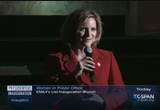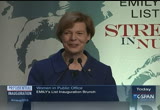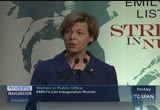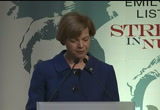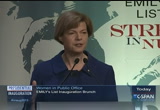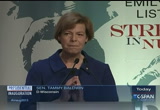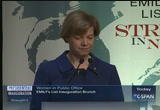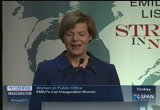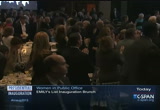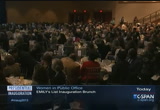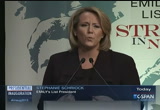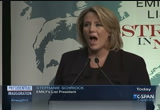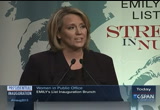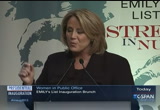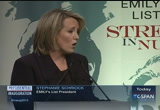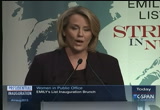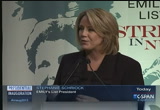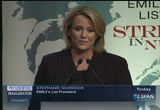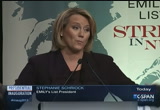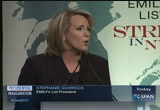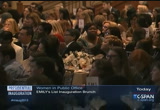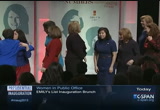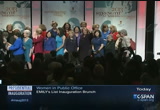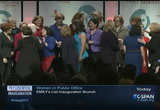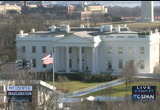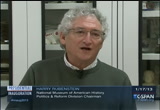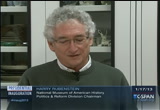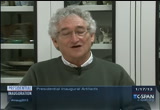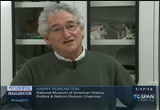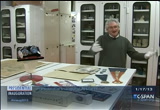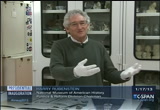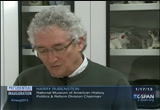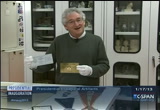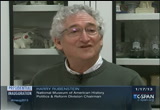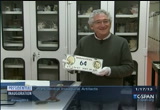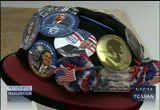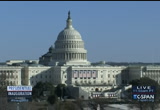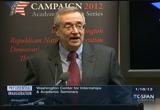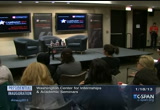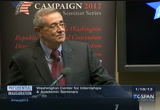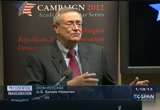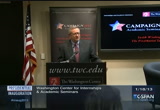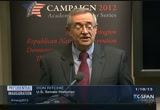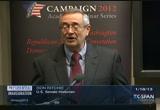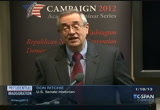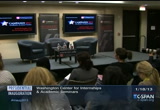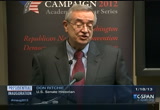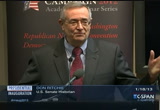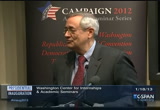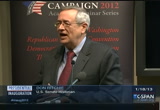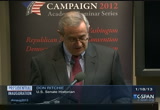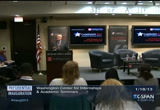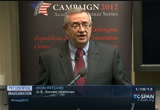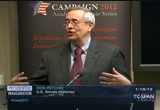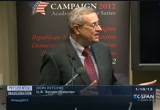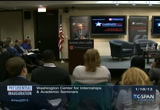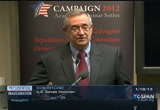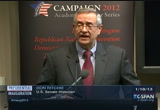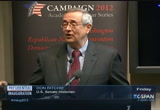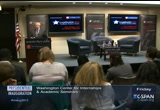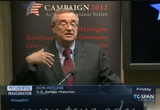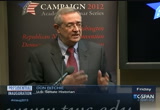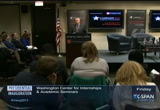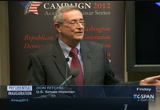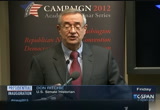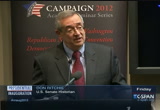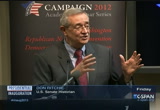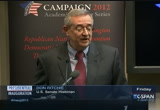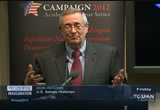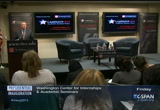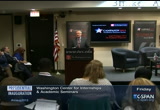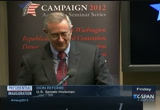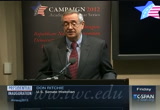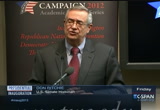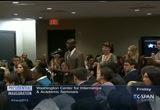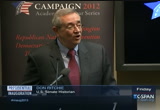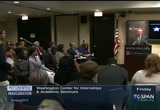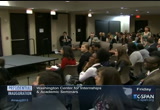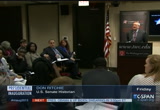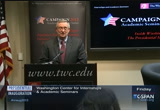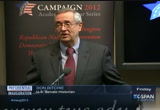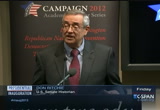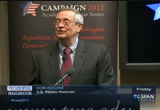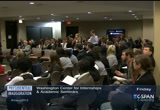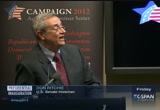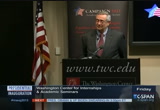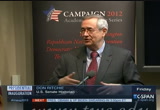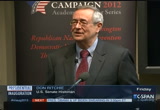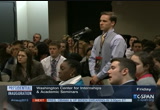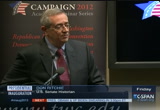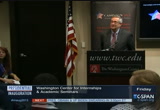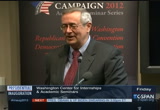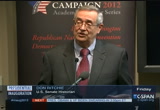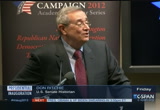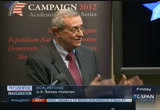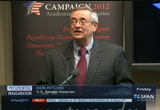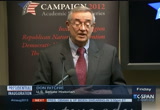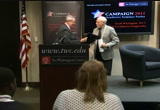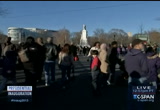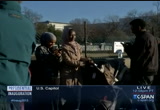tv News Public Affairs CSPAN January 20, 2013 2:20pm-4:00pm EST
2:20 pm
2:21 pm
done so much for me and so much to help elect pro-choice women across this country. i am so proud to be one of nine emily's list women reelected in 2012 to the u.s. senate's and one of 20 women sworn in earlier this month, the most ever in our nation's history. no one runs for senate alone. no one runs for senate alone and wins. i was never alone, not for a singesingle minute. you were with me every single step of the day. back in may 2011 when the senator announced that he was retiring, i convened a
2:22 pm
conference call to figure out whether there was a way i could step up and run. just like you have been with me for so long, emily's list was there for me at that moment. you were there day one when i ran for the house of representatives bac in 1998. the pungent scent i cannot win. you read there with me. -- you were there with me every step of the way. i became the first woman to represents a woman in the house o. and on the first day of this long journey you were there for me with sage advice, plenty of encouragement and a commitment to stand with me every single day.
2:23 pm
you follow it through and then some. thousands of you, your staff, your leadership that was not all. my campaign team developed their skills at emily's list either from your staff for excellent training. advisers and others alumni working tirelessly on my behalf. there lot of people that doubted that i could win. when ever they did family would say she is been under estimated career.r careeentire she can do this. if i ever doubt i could win all
2:24 pm
i had to do was remember they had been with me my whole career. we can do this. there are many people here who did so much i'm going to thank you the best i know how. i'm going to ask you to do more. in my election night speech i told the crowd that was gather theire have theas proud to honor of being the first woman elected from wisconsin and proud of the facts i would be the first openly gay member of the united states senate. i do not run to make history. i ran to make a difference.
2:25 pm
a difference in the lives of families 75 doric and pay the bills. students who are struggling with debt. the difference in the lives of veterans who fought for us and need someone fighting for them when they return home from war. the difference in the lives of all intrapreneur is trying to build a business and working people trying to build economic security. i ran to make a difference. i intend to make a difference. just like nobody runs and wins a senate race alone, no one moves a country forward alone. just like i could not have won the election without the people in this very room, we cannot move the nation forward without
2:26 pm
your continued involvement. look around you in this room today. it is extraordinary. on monday, looked across the mall. everywhere there are women whose leadership can change the course of history. thousands of them make a decision about whether to seek public office. too many will hear the voices of the senate. those that turn to emily's list training andl find wh support. many will run and many will win. together we will move our nation forward. i am a united states senator am emily.dwin and i m emil
2:27 pm
2:28 pm
sponsors and a special thank you is your council members. it is always great to see so many good friends, especially when we have so much to celebrate together. look around. this is what making history looks like. it is a senate with 21 men, including the first women senators from massachusetts and hawaii. it is 16 new pro-choice democratic women in congress.
2:29 pm
it is the first openly gay senator the first asian american woman senator. the first congress women who served in combat. we have three new women under the age of 40. it is a congress with no alan west, no joe walsh, and in no todd akno todd akin. we have fought so hard. we have one so much. we have come so far i am so proud as a woman and as an
2:30 pm
american. make no mistake. we are not done. we are still going to have to protect our middle-class from devastating cuts to programs that families rely on. we're still going to face threats to workers and voters rights. we're still going to hear phrases like legitimate rape and trans vaginal probe. it does not listen to reason. they sure do not learn from experience. if they remain as dangerous as ever. i have had enough playing defense. enough. we have earned this at the table
2:31 pm
many times over. now it is our time to take our place at the head of the table. this was a mandate for women's leadership. our lives were under attack. our candidates ran and won across the country. our vote proved decisive in electing the president. now it is our turn to drive the conversation. nobody works harder to turn out women's voters and emily's list. nobody knows more about why they voted the way they did. they stood up not just to preserve the right to make their own health care decisions but to secure equal pay for equal work, it to protect medicare for
2:32 pm
seniors and to build an economy that works for the middle class. that is exactly what we should expect from washington. i am proud to say we have a president we can count on it. president obama has taken strong stands with women and families on health care, equality, economic security. he appointed two fantastic women to the united states supreme court. he chose his biggest rival to be his biggest partner on the world stage. we are so proud of hillary clinton.
2:33 pm
president obama trusts women and women can trust president obama. we have reason to feel good about where we stand today. with the movements like the one we have built together we have reason to aim high in the years to come. last cycle we more than quintupled its the size of our community. we were using technology to open our doors to another generation of women and men where we meet up. we are reaching them where they are, helping them understand what is at stake and adding their voices to our movement. i am proud to say that emily's
2:34 pm
list is now more than 2 million members strong. let's make it 5 million. let's do it. i want to see emily's list expand to the next cycle. i literally mean right now. immediately. there are donor cards at your table and candidates who need to now. we are in the business of winning elections. i have been in that business awhile now. i have opened a lot of envelops from emily's list of donors. i have seen a lot. i have accepted speeches and i have helped make a few republicans give them.
2:35 pm
this is the difference between joe walsh and tammy, between taodd akin and claire m ccaskill, between mitt romney and barack obama. is matters. that is why even as campaigns evolve, our committment to winning will never change. nuts and bolts matter. we will continue to be there at the moments that matter most. we were there from the start in massachusetts. i answered all of elizabeth
2:36 pm
warrants questions about running for office would be like. she decided to run anyway. we were there in wisconsin when everyone else saw tammy baldwin as a long shot. i think they're close to did not think she had a shock at all. now they're calling her senate term. we read their in new hampshire for years building a pipeline of grapgreat candidates. new hampshire has and all women delegation led by a great democratic woman. we will be there to hold
2:37 pm
republicans accountable when they threaten our rights. we will be there to stand with our candidates when karl rove goes on the attack. we will be there in the final moments when mobilizing women voters makes all of the difference. the only thing that will change is that we want more members joining our cause, up more pro- choice women coming up through the pipeline. candidatess list running up and down the ballot. most of all, more nights like the ones we had on november 6.
2:38 pm
emily's list has been leading this fight for 28 years. we have seen so many milestones. we have stood by so many amazing women. we stepped in to help women take the next step. it started with barbara mikulski and has not stopped since. , kay hagan, com elizabeth warren, tammy baldwin, and the numbers keep going. we have seen so many incredible women in this room today. all of those victories have less
2:39 pm
us to this moment. we are ready to take the next step. we are ready to be the springboard for the next generation of democratic women leaders. ready to elect more democratic women governors in 2014. ready to help nancy pelosi get her gavel back. ready to put a democratic woman in the oval office. the stars with putting a woman on the democratic ticket in 2016. our goal is within reach. our movement has never been stronger. our time is now. there is strength in numbers and in this room. let's celebrate.
2:40 pm
2:43 pm
thank you all. [captioning performed by national captioning institute] [captions copyright national cable satellite corp. 2013] >> a look at the white house on this inauguration weekend where president obama was sworn in today. tomorrow any in the first lady will watch the parade. we will bring you live coverage from the u.s. capitol including the luncheon in the parade from the capital. our coverage begins at 7:00 a.m. eastern. the smithsonian national museum of american history has a large collection of artifacts from past inaugurations dating back to george washington. we spoke with terry rubinstein.
2:44 pm
>> here you are in the division of political history, and i have a number of object from our inaugural collection, which goes back to george washington, all the way to the present, and this weekend, we will be collecting additional material. inaugurations are these wonderful events. in many respects, they are like great, american holidays, like thanksgiving or the fourth of july, they are part of an american tradition -- an important one that celebrates american democracy, certainly one of the great contributions to the world and to all of our lives. that is with this material is. we try to document the individual inaugurations and the whole part of it -- not just the official part -- the parts that everyday people participate in
2:45 pm
as well. inaugurations serve a simple function. on one hand, there was a constitution every president had to -- in the constitution every president had to take the oath of office, and that was not only to serve in this office, but to protect the constitution. they are the branch of government to preserve this form of government. there is something very reassuring about this notion that every four years, whether it is your candidate or your opponent, they will be gone after a certain length of time, and that is the celebration of the in and out of the presidency that makes it so important. we can date our collection to these brass buttons that were made for george washington's
2:46 pm
first inauguration in new york city. they are a simple brass disk, often with the letters g w on them, and you could pin it to your close or sell it on. it demonstrates the relationship between the presidency and the citizenry, which is really the key, and really when inaugurations are part of. there are these wonderful smash- ups -- part coronation, part celebration of american democracy. that relationship is really key. they are also celebrations of national unity, and there is a
2:47 pm
little bit of partisan gloating. one of our great treasures is this flag from thomas jefferson's first inauguration in 1800. you can see, looking at this banner, what it says -- the eagle holds these ribbons, and on one it says t. jefferson, president of the united states, and on the other, john adams is no more. that celebration, the union and be out, -- the unit in the out, that is what we are looking for, the relationship. you can look at these inaugurations as touchstones along our national narrative of the changes that have taken place. some of them are technological. the question of george washington writing in a carriage, somebody else in a car, the introduction of radio, television and the internet to record these things -- there are different steps along the way to record, but a continuity -- a
2:48 pm
kind of reassuring continuity that is important for holidays. you know that thanksgiving in our houses like this. we serve mashed potatoes this way. we have our inaugurations this way. there is very much the same kind of spirit. i pulled a few simple things to give you a sense of the taste and feel of inaugurations. one aspect of inaugurations really from the very beginning is the inaugural ball. these are celebrations in which this candidate, now president, is introduced to the public thomas as well as celebrations of everybody coming together --
2:49 pm
public, as well as celebrations of everybody coming together, recognizing supporters, and in the early days introducing this politician to the diplomatic corps in washington. so, here is just a sense. here is an invitation for james k. polk's inauguration in 1845. this happens to be for the $10 ball. polk and tw oh inaugural balls. one was the -- had 2 inaugural balls, and then one was for the everyday citizens. they confuse the invitations. the diplomatic corps got the invitation for the two dollar ball.
2:50 pm
there were the diplomat's wives dancing with their gardeners. this is a common story. we collect this kind of insanity -- this kind of material. this happens to be the abraham lincoln inauguration, documenting that formal sense, but there is a quality to these inaugurations that are very important because the tone is very carefully constructed, often. sometimes you lose your control, such as with polk, but often times everybody knows that every aspect of an inauguration will be examined for meaning, what is being said, the undercurrents -- do you ride up to the capital in a carriage in splendor? do you walk back as a man of the people, as jimmy carter did? there is careful balance. when you look at some of this material, you can see over time that, in fact, they are carefully crafting it as well. i have always been amazed in looking at jimmy carter's
2:51 pm
inaugural serial, how informal his material tends to be compared to other presidents, and it is clearly a statement that following the nixon years, the imperial presidency, they were going to have a residency of the people -- presidency of the people. you notice that on his tickets, rather than having an inaugural ball, he has an inaugural party, which is a clear statement. then, you can come back to ronald reagan, and lo and behold, no surprise, there is a rejection of the jimmy carter years, with a very formal, gold tickets to inaugural balls, and clearly it is an inaugural ball.
2:52 pm
the program that seems sort of informal for his, becomes pinched very formal -- becomes very formal just a few years later. this says something about those administrations and what they are trying to conceive and produce during those events, and it also says something about all of us as well -- something about the nation, its feelings, what it was looking for because they are certainly trying to play off of that as well. part of the material that we collect is just about the enthusiasm. now, inaugurations are meant to be days of national celebration and national unity. they are not, obviously, always that way, so these kind of souvenirs that people might create, just as in the days of george washington -- you know,
2:53 pm
here are these brass buttons, these little penance that people could buy from the vendors on the street and take home. i particularly like this. this is a little glass tray, sold on that day to mimic a card that says mr. and mrs. john f. kennedy announce a change of address to 1600 pennsylvania avenue, and then it says at home, january 20, 1961. now, a lot of the stuff is made with a little sense of humor, enthusiasm, a little exuberance, and that is really what we are trying to capture in this collection. so, the idea that people actually get license plates -- these are good for a day, maybe a week, you can put them on your car. you are part of the celebration. go to the parade. this happens to be from
2:54 pm
kennedy, 61. you can watch from below for those that are a little shorter. you see this continuity, is ongoing of the material, and this expression of exuberance in a lot of the material. kennedy, and then 50 years later, here is one for the obama parade. you can see it in the individual things that people make. my colleague was standing in the crowd next to a woman wearing this hat at the next inauguration, and i think it just speaks -- the kind of enthusiasm that we all witnessed on the mall in 2009. april came full of support, excitement, -- people came full of support, excitement,
2:55 pm
enthusiasm, wanted to be part of this larger experience, and i think that is, in part, what inaugurations are all about. >> not a look at the western side of the capital where president obama will be publicly sworn in tomorrow. special flags are hung on the facades of the capital. guard wills -- guardrails and chairs set up for those with tickets. we will have live coverage starting at 7:00 a.m. eastern time tomorrow. we're going to take a blue nl at -- look at don ritchie with a historical perspective. he also talks about vice- president andrew johnson's
2:56 pm
inaugural address. this is about one hour. [applause] >> thanks very much. that was a tough act to follow, but i will try my best. we are about to have an inauguration monday, and the first question that comes to people's minds as they are sitting or standing there in the cold waiting for the ceremony to begin, we have separation of powers in this country. how is it that the president of the united states is being sworn into office on the steps of the capitol -- the legislative branch of the capital? that is the thrust of my comments. how did this come about? it is not in the constitution. the constitution tells you the date and the time the president
2:57 pm
needs to be sworn in, but not the -- it tells you the exact words and oath, but not anything else. yet we have this tradition built up against presidential inaugurations. it comes down to which came first, chicken or the egg, and the fact is in 1789, when this brand-new government was was getting started, the first part of the government to meet with the congress. it was supposed to meet march 4, but congress had trouble establishing a quorum, and it was not until april that the house and the senate got their quorum and they could do business. the first order of business was counting the ballots. it was relatively easy since it was unanimous that george washington had been elected president. the first thing they had to do was notify washington that he
2:58 pm
needed to come to new york city where the federal government was meeting. it took a while in those days to get wherever the federal government was, so they had a couple of weeks to work things out. the first thing they did was to write and know for everybody else to take, including the vice president. congress writes the oath that every other person that works for the government, from military, two judges, to legislators, that is written by congress. it has changed at various times. the oath that the president takes is unique, it is in the constitution and it has never changed. the question was where are we going to swear in the president of the united states? the congress was meeting in federal hall on wall street. it was a nice looking. the house had the bigger room upstairs, and the house at the president should be sworn in in our chamber, and that was fine except everybody that was in new york wanted to see george washington get sworn in so they
2:59 pm
could not divide everyone in the house chamber, but upstairs they had a balcony overlooking wall street, so the senate said, upstairs, and we will have the ceremony up here and washington could take his oath on the balcony. those decisions, which were logical, set a precedent. ever since, president has taken their oath more often than not outside and more often than not congress has taken a lead. vice president adams was the president of the senate at the time, and he was a useful player because he had been the us minister to england, and one of the questions was there were not enough seats upstairs, and he said in parliament when the
3:00 pm
house of commons marches to the house of lords, they have to stand up, and that adds to the drama and the house members can stand up for whatever the ceremony is going to be. fortunately, these days, we do have seats. when washington arrived, there was a lot of commotion. he was welcomed. the barge came across the hudson river. there were parades, fireworks, activities. they were before the inauguration, rather than after. then, he stepped out onto office -- livingston gave the oath of office area -- of office. so, here is president washington, he had just been sworn in, the crowd cheers, and then he comes back into the senate chamber and delivers an address.
3:01 pm
there is no mention of an inaugural address, but the president of the united states have been giving inaugural addresses since george washington led the procession. one of the senators said that washington, who everybody thought of as they great strongman was trembling. he was quite nervous. the people never did hear what was going on. then, in 1796, after washington -- 1793, i should say, after washington's first term was over, he was elected to the second term, they were in washington, and at this point washington gave the shortest inaugural address, relatively brief remarks, but following
3:02 pm
this tradition, and still the u.s. congress was hosting this institution. now, one of the strange things about the inauguration, and one that leads to controversy is that, as i mentioned, the constitution write out the oath of office. one thing the constitution does not say is concluding the inaugural oath with "so help me god." yet most president say so help me god. there was a folklore that develop that washington said so help me god, and we were looking for sources to verify that he did or did not say "so help me god," and we are not so sure about this. one of the account was given by washington irving, who was about five years old at the time, but years later he gave his remembrance. we still do not know what happened at this stage. it is up to the president of the united states to say whatever he wants, and most president in the 19th century did not repeat
3:03 pm
the oath of office. they just said "i do." what is interesting to me is that the chief justice that swears than in says "so help me god." if you are going to be a strict interpreter of the constitution, it is not there. if you are wondering why the chief justice puts this in, it has become tradition, because it is much more important than even the cartridge -- constitutional structure. it has become a point of controversy. i should say that chief justices of the united states have been known to occasionally
3:04 pm
to bungle the oath of office. one reason they do fumble is because they are used to giving the oath many times. it is not the same oath we take. the oath that we take is given by congress, and that oath does end with "so help me god." the military oath ended that way, so it was natural for washington to say it on that occasion, although not required. in defense of chief justice roberts, he is not the first to get the words confused. william howard taft, who was a distinguished chief justice, swore in herbert hoover in 1929, and that ceremony was carried over the radio, and a little girl wrote in to justice taft and said you got the words wrong. that is not the order of the words. he wrote back and said i am sure that i got them right here at -- right.
3:05 pm
they played the tape, and found that he had reversed some of the words. the fact of the matter is it does not make a difference if the chief justice skips a word, or gets a word out of order. as i mentioned, the presidency in the 19th century, and even herbert hoover just said "i do," and that is certainly appropriate as well. we moved down to washington, dc, where the first inauguration is taking place, and there is a change of party for the first time, from the federalists, who were more formal, to the new republicans, jeffersonian republicans, or the democratic republicans, who felt more than they were the party of the people. thomas jefferson was being
3:06 pm
inaugurated, and he did not want a lot of for the role with his inauguration. he stripped away a lot of the formalities built up under washington and adams. so, thomas jefferson is living in a boarding house across the street from the capital, about where the library of congress stands today, and when the time comes he just walks across the street, and he is just just fairly casually. he goes to the senate chamber to the senate chamber happened to be the largest chamber in the capital. the house with meeting in a room that is today occupied by a single senator, is to give you some sense of the portions, because the house wing had not been built yet. only the senate wing had been constructed. thomas jefferson went to this and he was sworn in by his
3:07 pm
political opponent, and also his vice president, aaron burr, who was also a political opponent. it must have been a tense inauguration. then, he delivered his inaugural address in a voice that was so low that most people in the room, and the room was absolutely packed from all the the descriptions, most people could not hear what jefferson was saying. thomas jefferson, as president, delivered to public speeches in the entire eight years of his presidency. what was his first inaugural address, and what was his second. he figured that was his minimum. washington and adams had gone to congress to get their state of the union addresses in person, but jefferson thought this was too much like the kink going to parliament, too much
3:08 pm
like a -- king going to parliament, to regal, too much like a royalty. they sent it up for the clerk to read. most people were not paying attention, and they missed the opportunity to take leadership over the legislative branch. it is not until 1913 that a political scientist named woodrow wilson is elected president and said there is nothing to prevent me from going up there, and this would be a great way to present my legislative program. so, wilson starts going in person. he is delighted that he thought of something theodore roosevelt did not think of, and he knew it would drive him wild to think that he missed that opportunity. ever since wilson, almost all
3:09 pm
president of the united states have taken the opportunity to go to congress in hers and. jefferson -- to go to congress in person. jefferson, as i say, was trying to downplay a lot of the ceremony, but he also understood the need for an inauguration. he understood the purpose of it. after a divisive election, the election of 1800 was one of the most divisive, and everybody has to choose sides, the inauguration is the moment that we all come back together again. this is not a presidential candidate. this is the person that was elected. this is the person that is going to lead the country for the next four years. we need to put aside the elections, heal the wounds of the election. so, in the election, jefferson says we are all federalists, we are all republicans, basically, we are all americans, coming together and we are going to work together. this is the hope that every president has is -- in his inaugural address, and that is one of the main reasons for having this great ceremony each time, to put a cap on the end of the election and to ring the nation back together again for the next president term. -- president's term. now, you have the government in washington, and they have established precedent. by the time james madison is inaugurated, the house chamber is completed.
3:10 pm
i do not know if you have been to statutory ball, james madison was inaugurated there, both terms as president. james monroe would have been inaugurated in the old statuary hall, the old house of representatives at the time, except that the british had burnt the building down in 1814. we were at war with great britain, and british troops came down maryland avenue, burned down the capital, the white house and most other unlike buildings in washington, dc. so, they could not hold an inauguration in the house chamber. instead, they don't they temporary -- they built a temporary capital that became known as the old pre-k capital, and it stood where the supreme court stands today as it was not begin of to accommodate the crowds so monroe is inaugurated outside, on the steps. it was a good tradition, but it did not immediately catch on.
3:11 pm
inaugurations on those days were held on march 4. if you think it is bad in january, the weather in march can be pretty cool as well. we have had a history of bad weather on march 4, so presidents preferred to be inaugurated in doors. munro was held there as well. andrew jackson, when he becomes president -- john quincy adams is also in the old house chamber -- andrew jackson, the man of the people, the great hero, the hero of the war of 1812, fighting in that last battle in new orleans that we are about to have the bicentennial of -- he draws a large crowd to washington, dc he becomes president in 1829, and he stands outside on the steps of the capital, and that begins a tradition from andrew jackson, to jimmy carter, of presidents of the united states standing on the east front steps of the capital. if you can imagine the capital, the capital, though -- capital's primary entrance is on the east front. e-book booking the other side is the front of the capital. -- people think the other side
3:12 pm
is the front of the capital. the capital has no front. the west front, looking down the mall, which is now a magnificent this do, did not look anything like that in the 19th century. that west front was not developed, nor was the mall developed. inaugurations were done on the east front, and that involves building a platform. because it got bigger and bigger, as you are accommodating more evil, which is more people, and you -- more people, and you had to accommodate the television, and the media in the 20th century, so they had to build a big platform across from it for the media. it got so big, in fact, that anybody who wanted to see the inauguration could not stand behind it because it blocked
3:13 pm
your view. they had to stand on the side to see what was going on. also, they had to start building this in september, before the election. that took up all of the parking places. in those days, members of congress used to park on the plaza. they did not like the idea that they lost their parking places. so, the joint committee on the inauguration, which is a congressional committee that hosts the inauguration, decided to move the inauguration in 1981 to the west front of the capital.
3:14 pm
this creates one of the great myths about inaugurations, and i guarantee you will read it in at least one newspaper outlet during this inauguration, and that is somebody is going to say well, they inauguration was held on the west front of the capital since ronald reagan was president because he was governor of california, a man of the west, and wanted to face to the west as president and he picked that side. now, the problem with this is the joint committee on the inauguration tix that site in june of 1980, and ronald reagan was not even nominated until july had -- july. the inaugural platform under construction in november -- and jimmy carter were reelected, he would've been sworn in on the west front. if john anderson would have been elected, he would've been sworn in on the west front. ronald reagan was sworn in on a decision made by the joint committee on the inauguration.
3:15 pm
now, ronald reagan was smart enough to realize that he could take possession of this, even though he did not order this, or choose this. he put it in his inaugural address and he said i am the first president to look west, looking out over the graves of the heroes in arlington cemetery, towards the pacific. he took ownership of that move from the east front to the west front, even though he was not the person to choose it. this is an important lesson in saying who runs the president inauguration -- the president's inauguration? ever since the president akin to the capital, congress has run the inauguration, at least the the part that takes place during swearing-in. that part has traditionally been done by the congress. they start one year in advance, long before they know who will be nominated or elected. they start to make the plans,
3:16 pm
they take a theme for the inauguration. they build a platform, print the tickets. they get everything underway, so that when somebody is elected in november, they can get everything done between november and january. now, for a long time in american history the inauguration was on march 4. so, they had longer to prepare for this, from november until march, but in 1933, the constitution was amended with the 23rd amendment, which moved the end of duration up, so no on january 3, the new congress comes in -- the inauguration up, so now the new congress begins on january 3. congress creates a joint committee on the inauguration, and usually it is chaired by the chairman of the senate rules committee, and it is cochaired by the speaker.
3:17 pm
it is done jointly between the two houses, but traditionally the senate has taken the lead and does quite a bit of it. they work right now with a staff of about 14 people dealing with this over the last year. now, there is a second inaugural committee, and that is when somebody is elected president, and when -- the first thing they have to do is appoint their own inaugural committee, the cousin after the president leaves the congress, everything is taken -- because after the president leaves the congress, everything is taken over by the committee. they have a staff of 100 seven people. how come the congress is working on such a small staff? everything we do at the capitol is paid for by the government. once the president leaves and heads to the white house, his committee has got to pay for everything. they pay for all things related to the balls. raising the funds for private sources to underwrite what is going on. ronald reagan gets a lot credit for moving the inauguration when he did not move the
3:18 pm
inauguration. he moved the inauguration of four years later. that was in 1985. it was below 7 degrees. it was a bitter cold day in washington. the reagan white house the night before looking at the weather forecast thought it was cruel and unusual punishment to make people outside in this weather. they call the chairman of the rules committee and the inaugural committee and said, we think it should be moved aside to the rotunda. being part of a joint committee, he thought the best thing was to call tip o'neill. it was finally tracked down in a bar where he was watching a basketball game.
3:19 pm
speaker o'neill said, it is his inauguration he should have it where he wants it. congress cooperated and moved it inside. most people saw it on television at that point. the architect of the capital said, i would be impeached if i moved the inauguration inside because there are so many people coming to washington. a lot of inauguration's have been held out in pretty miserable weather. there was a blizzard going on when william howard taft was inaugurated. they still had a completely out door ceremony. it was part rain for herbert hoover. he and his wife rode in an open car.
3:20 pm
john f. kennedy had a blizzard the night before his inauguration. students came out to help shovel snow so they could have a parade the next day. people who want to kennedy's inauguration, the first thing they talk about is the weather that day. what about the vice president? it used to be there was a tradition that the vice- president got his own inauguration. when the congress and presidents to use to begin their terms on march 4, the first thing that would happen is the house and senate would me to swear in their new members. the first thing they had to do was swear in the vice president. presidents of united states used to go to the senate chamber to watch their vice president be sworn in.
3:21 pm
the senate is to give the vice- president a chance to deliver his own inaugural address. i am sure joe biden would love to have that opportunity. it did not always work out well for vice presidents. in 1865, lincoln's second term, that magnificent speech, healing speech -- his vice president was andrew johnson. a fusion ticket in 1864. johnson arrived with the flu. he gave, for what it was all accounts, a completely inebriated address. lincoln was mortified. it set the public image of andrew johnson. another disastrous vice- presidential inaugural address was calvin coolidge's. he used that opportunity to
3:22 pm
state and how the filibuster should be done away with. president roosevelt's second inauguration, that is when the congress started before the president. now presidents and vice presidents began to be sworn outside of the steps. there was one exception in the long tradition of inauguration's being held in the capital. that was in 1945, when franklin roosevelt was being sworn in for a fourth time. he was the only president of united states to serve more than two terms.
3:23 pm
his third inauguration was of the capital. his fourth one was in the middle of world war ii. he felt this is not the opportune time to have an elaborate inauguration. it decided to move the inauguration today in front of the capital. could he do that? he did. the joint inaugural committee was not happy with that decision. the president of united states can decide above and beyond the date and time they're being sworn in, among other things. we move them from the east front to the west front. the crowd had been getting bigger and bigger. one reason to have them on the west front is because you could
3:24 pm
accommodate more people. if you look to the photographs of the last several inauguration's, you can measure the crowd by how far it goes back. when ronald reagan was the first sworn in, the crowd went back to maybe a block beyond the reflecting pool. with each inauguration, the crowd gets further back and for the back. until 2009, when there was so many people but they went all the way back to the washington monument. crowded on to the mall, on one of the coldest days in washington. it was a nice atmosphere.
3:25 pm
one of the most remarkable things is you had a million and a half people standing. there was not a single arrest made that day. they did need to have a lot of medical assistance. there's always somebody who is going to collapse and need assistance. they bring in trailers with doctors and nurses around to be able to treat. despite the fact we had increased security, it was a very peaceful day. not everyone agrees with the inauguration. there is always a dissenter. the secret service and police reserve spaces outside, particularly on the parade route, for groups of the call first amendment groups. under the first amendment, you have the right to peacefully demonstrate, to speak out and
3:26 pm
assembled. inaugurations have incorporated that. i recall inaugurations during the vietnam war when there were demonstrations and protests despite what the assigned areas were along the way. from the president to his opponents, everybody sees some importance in the ceremonies involved in this. the other thing that has happened is that more people to see it to are not in washington. in the 19th century, if you were not in washington, you read about it in the newspapers. in the 1940's, you could watch
3:27 pm
it on television. and now it is web cast around the world. the audience for the inauguration is enormous. that is an important moment for the president as well. it is his moment to speak not only to the entire country, but the entire world. inaugural addresses tend to be more eloquent and they tend not to be as specific as the state of the union message. the state of the union message is essentially a laundry list. inaugural addresses tend to rise above that. some of them have been incredibly eloquent. lincoln's was carved on the wall of his monument. a lot of other addresses have not perhaps present that level, but presidents are always striving for that degree of eloquence. the big excitement is the first
3:28 pm
inauguration. there is never as big of a crowd for a second inauguration. people say, why do they need all this ceremony? it is still an important moment. if you look at recent history, less than half of our presidents have had the opportunity to have a second inauguration. the ones who do often have a clearer sense of what they want to accomplish. after four years, they've gotten a better sense of what your administration is about. lincoln's first inauguration, he is begging people not to leave. a second inauguration that is particularly memorable as
3:29 pm
franklin roosevelt's. by 1937, franklin roosevelt knew what the new deal was about. his second inaugural address was much more specific and is really arguing for continuing the crusade. it is his speech about seeing one-third of the nation still ill fed and ill clothed. second inaugurations are often much more pointed as far as the president is concerned. what should you look for in his inauguration? it is going to be a coming together. it is going to be the
3:30 pm
legislative branch hosting, the chief executive sworn in by the chief justice of the supreme court. huge numbers of the public will be there to see what is going on. i think the fact that congress continues to hold these inaugurations is a sign that we're coming together. as a historian, i never like to predict the future. i tell people i like to predict the past. i will absolutely predict monday's inaugural address will and the way i am going to end right now, which is thank you, god bless you, and god bless america. [applause] i have been asked to open the floor for questions.
3:31 pm
3:32 pm
as compromises. it bothers me a bit when everyone says, this is what the founding fathers meant. we historians are not certain what the founding fathers meant. we have to make a good-faith effort to interpret. we go to their diaries and other materials to understand. you asked about what it would think about the government today. i think two things. it would be surprised about how much the government still resembles the government that they drafted. the u.s. senate today has every power that was given to it by the constitution in 1789. almost every other government in the world that has an upper house has taken away power from the upper house.
3:33 pm
the presidency has grown. they thought the presidency should be a strong institution, and that is one reason why the rallied with george washington. what would astonish them is the size of the government. and the size of the country. there would be astounded at how big the federal government had gotten. i think it would take the breath away. and they would probably also be astonished at the salaries everyone is getting, and the office space. it is still very close to the institution they created.
3:34 pm
>> based on your access and longevity, honorable longevity in your field, whose reforms do you think were most effective in the inaugural activities? >> they begin a year in advance. they start working their way through this process. i happened to a lot of the joint meetings. it is a lot like planning d-day. so many people coming in from out of town. it is a phenomenal practice. to give credit to the president also committee, they do not have anywhere near as much time as the jcc does. the people for running president obama's second inauguration are the same people who ran his first inauguration.
3:35 pm
they know the ropes. it will be hard for the next president coming in to do something like this. the one thing they all find in the end is there is an enormous demand for tickets. there is still a greater demand beyond however many tickets you print. they have tried to accommodate the crowds by putting up very large screens along the mall, sound systems so you can see and hear things.
3:36 pm
they promise there will be an adequate number of port-a- potties. >> how will this inauguration be different from the first inauguration, what can we expect to hear from him in his inaugural address? >> it will not be as big. they kept the number of buses that have been rented. it is not running nearly as big as it was. they still expect that the crowd at the second inauguration will be larger than the average crowd. it will be hard to meet that 1.5 million or so from before that. as for what the president says, my suspicion is -- and the
3:37 pm
second time around, presidents have a clearer idea of what they can do. i suspect there will be more specific goals as to where he wants to lead us this time. i have not spoken to his speech writer. i cannot give you any inside tips on that. >> i am studying history and museum studies. i am interested in knowing in hearing about what you think the most significant development is in the history of the inauguration. >> the media developments, the fact that inaugurations are now internationally broadcast is the most important part that has changed over time. everyone wanted to see george washington sworn in. but there were not that many people who could get to new york. even andrew jackson, by the time you could get railroads, people were shocked by the amount of people who came to see him. that would be a small number today. >> i have the pleasure of meeting you on the senate floor, when i took a trip with suffolk university.
3:38 pm
ever since that day, i have had the same question. he came out with a book, defining the filibuster. how exactly do you feel with all your experience on the filibuster? >> there is a division between political scientists and historians about this. political science will look at the system and say, what is wrong with this. the historian will look at it and say, how did it get way. we tend to be less active in suggesting changes to the system. floyd riddick said, the rules of the senate are perfect. what he meant by that was, the senators have exclusive control over writing their own rules.
3:39 pm
these are the rules that have written, and this is what i carry out. if the want to change them, they will change them to fit their circumstances. they have been filibustering since 1789. the senate and house have developed in remarkably different ways over time. the constitution said, each house can write their own rules. you come to the senate. the rules of the senate have always given much more muscle to the minority. sometimes it is the minority party. sometimes it is a minority faction inside a minority part to says, "i object," and everything stops. every senate majority leader is
3:40 pm
under a lot of burden to try to get a very uncooperative organization to work together. the concept of rules giving the minority some clout in the senate, they have to forge bipartisan. the senate was able to pass bipartisan majorities a farm bill. a post office bill, and the fiscal cliff. the house did not pass any of those things. it finally passed the fiscal cliff because the speaker took off the lid and said, everybody can vote on it. the reason for the difference is because the have majority rule in the house, people look on it as a sign of weakness. the speaker of the house has to go to the minority party for support. the speakers of the house only want to proceed is to have majority of their own parties. the farm bill did not pass. the housing bill did not pass. even though they are generally supportive and people are waiting for the farm bill to pass.
3:41 pm
the filibuster did not create as much of a gridlock as majority rule did. some of the senior senators are looking for solutions to of all. they're going to see some modifications. i do not think the filibuster is going to go away. i think they will try to get over some of the speed bumps. you've got a terrific professor, i did an oral history with him. his interview is on the senate website. >> i majored in politics. my question today, is a reasonable believe that president obama's second term will be similar or different
3:42 pm
from his first, considering that the same economic crisis still exists, even though you mentioned that the second inauguration is traditionally about more specific, what you want to talk about, now that he no longer has to run for reelection? >> second terms have been filled with totally unpredictable things. franklin roosevelt, you would think he was completely in charge. the first thing he did was asked for support to increase
3:43 pm
the size of the supreme court. richard nixon took the oath of office after winning a huge victory in 1972. in 1973, he was on top of the world. a year-and-a-half later, he was resigning because of the watergate scandal. there are a lot of things that you cannot predict. you hope that president after the first term are much more in control of what is going on, but circumstances are going to be beyond their knowledge at this stage of the game. i am afraid i cannot predict. second terms have often not been as productive as first
3:44 pm
terms. ever since the 20th amendment, the president became the lame- duck. that means he cannot run again. he can put his support behind somebody, and that will be a strength. it remains to be seen. >> i study economics and marketing. with the change in time and the change in culture throughout the years, i feel that we now view the inaugural address as more of a grand media spectacle instead of focusing on the credibility of the oath taken by
3:45 pm
the president. do you see it as a huge spectacle now, all the people having fun there, or is it actually taken seriously still? >> you need to have ceremony. the person who understood that best was ronald reagan, who spent his career in hollywood. the first time i ever saw him in person was on the steps of the capitol in the summer of 1980, when he came to film and television commercials for all of the republican candidates to congress. i was in a small group of staff watching this. he was the only one who remained in character, pay attention to the speakers throughout the whole thing.
3:46 pm
everyone else when they got out of camera range reverted to their normal state. i am thinking, this guy "is going to be tough to beat. as president, he understood how to use the symbols of government, including inauguration. there is a huge spectacle. it is also a celebration for the people who worked hard for the presidential candidates. what did the president actually say during the inauguration, what was the weather like that day -- historians, journalists, are always looking for an omen. i cannot tell you how many new books have said, when the president began to speak, the clouds lifted. there is substance to it. there is a lot of partying goes on as well.
3:47 pm
>> a like to ask you a question regarding legacy. andrew jackson was a man of the people. given the great deal of support that president obama has received in the 2009 inauguration, what might we expect to hear from president obama that might define or establish his legacy on monday? >> they campaign for history. they get conscious of their role in history. what do they want to be remembered for. the president to did not get a second term or whose second term was considered disastrous
3:48 pm
often wind up campaigning even harder. some of our presidents have been great ex-presidents. i think president obama will use the opportunity to try to define how it wants people to think about him, not only just now, but in the future. interesting that this inauguration falls on martin luther king's birthday. and 50 years ago, in 1963, that king gave his speech on the steps of the lincoln memorial. i am sure there is going to be some connection to that in the process. this is a fulfillment of what king had looked for.
3:49 pm
but what is left, what would expect to be done, i am sure that is part of the president's thinking. it is a little strange, also, for those who work for the federal government in washington. we always get king's birthday off. the question is, why didn't we have the inauguration on sunday? we've never had a formal outdoor ceremony on sunday. the sense is that the president should be sworn in privately on
3:50 pm
the white house on sunday. it is a wonderful coincidence that obama's is being held on martin luther king's birthday. >> we have had many speakers come this week and talk about the current polarization of congress. what you think about the polarization of congress? how can we bridge the gap going forward? >> is definitely polarized. the two political parties have changed dramatically in the last 30 years. when i came to work in the senate in 1976, both political parties were internally divided. each party had a liberal and conservative wing. you had some democrats that were more conservative than the rest of the republicans. every vote was a bipartisan vote.
3:51 pm
both groups tried to get the people in the middle to swing the way back and forth. political scientists thought this was terrible. what has happened is, over time, both political parties have become more internally cohesive. the basic reason for this is the southern states migrated from the democratic party, to the republican party. it held for internal cohesiveness. party leaders worked hard to keep their party conferences together. that means there is less middle ground to be able to pull over. this would be natural in any parliamentary government around the world. and those governments, the
3:52 pm
parties sit facing each other. they're quite rude to each other. the u.s. congress rules haven't evolved to meet this situation. much of the polarization is not internal, it is external because of the people who get elected. >> our nation is separated from church and state. what are your thoughts and using the bible, and the words "so help me god" used? >> not only did george washington have a bible, but after his inauguration, the congress voted to have a church service. they went across to st. paul's chapel in new york, and had a service. there was no first amendment at that time. what has happened now is that
3:53 pm
congress does not vote in these things. presidents choose what to do. since roosevelt's time, presidents have usually gone to a church service on the morning of the inauguration or just before the inauguration. that is personal to them. they choose whatever bible to hold. just like members of congress can choose a family bible or historical bible. when the first muslim was sworn in, he was provided with thomas jefferson's copy of the koran to be sworn in. people choose something appropriate to them. "so help me god" is another issue. i do not think there is anything wrong with the president saying it.
3:54 pm
the question is, why is the chief justice reading something that is not in the constitution. >> good morning. i attend miami-dade college. what has led you to be an oral historian, and what is your favorite part about being one? >> oral history is something that i stumbled into. the person i was writing about talking to me, telling me in the first person about his childhood and life -- he left out any mention of his family. he did not mention his children. he did not mention the income-
3:55 pm
tax case decided to jail. he talked about his glory days -- that sent him to jail. he talked about his glory days. i started out and started interviewing his widow, his children, his love partners, the person who prosecuted him. i got an interview with his psychiatrist. it changed the nature of my research and made my book much more interesting. one of the things asked for my job description was to create an oral history program. i have been doing oral history as staff since 1976. sitting down with a staff director who were involved in crafting some major legislation and to evaluate the various senators, sitting down with some of the senators and talking about, what is it like -- i interviewed a man who spent 22 years as a staff member and two years as a senate member.
3:56 pm
wonderful human insights. sitting down face to face with people, getting the kind of information, and then being able to put it out. it is a big thrill to me when i see in historians using oral histories in one of the books. i did a great sense of pride when i come across a quote from someone that i interviewed. thank you for asking. [applause] [captioning performed by national captioning institute] [captions copyright national cable satellite corp. 2013] >> a look at the western side of
3:57 pm
the capital. you can see the special flags on the side of the capital, including the bets ross flag. 600,000 people are expected to be there for the inauguration. the president's public swearing in tomorrow, some of the handrails are already set out for people who have tickets to the event. we will have live coverage of the inauguration. coverage will start at 7:00 a.m. eastern time, including the swearing in at noon.
134 Views
IN COLLECTIONS
CSPAN Television Archive
Television Archive  Television Archive News Search Service
Television Archive News Search Service 
Uploaded by TV Archive on

 Live Music Archive
Live Music Archive Librivox Free Audio
Librivox Free Audio Metropolitan Museum
Metropolitan Museum Cleveland Museum of Art
Cleveland Museum of Art Internet Arcade
Internet Arcade Console Living Room
Console Living Room Books to Borrow
Books to Borrow Open Library
Open Library TV News
TV News Understanding 9/11
Understanding 9/11